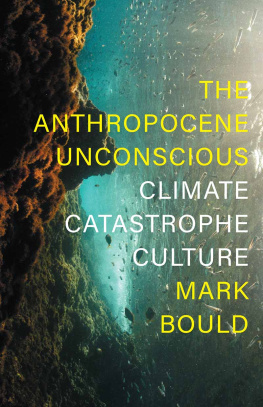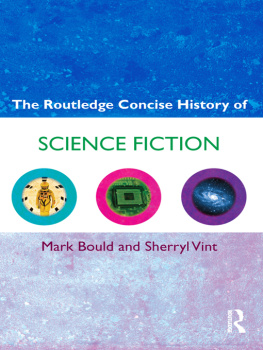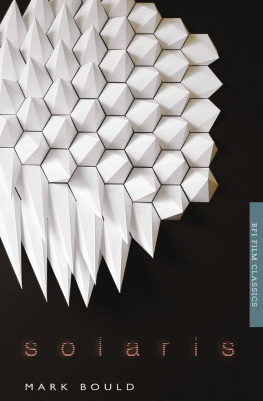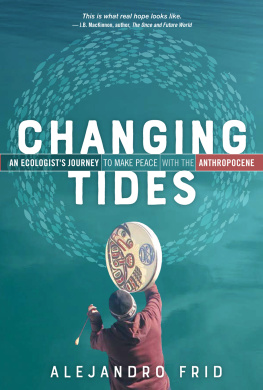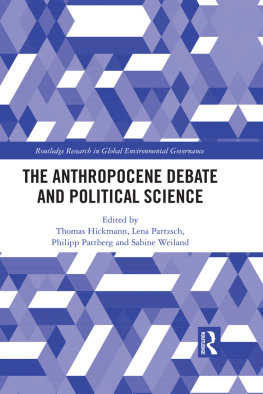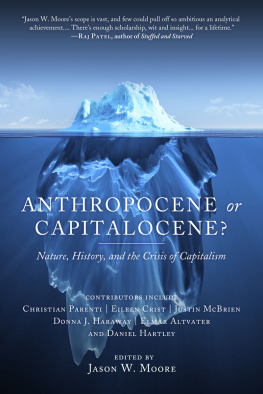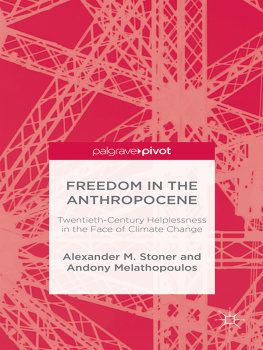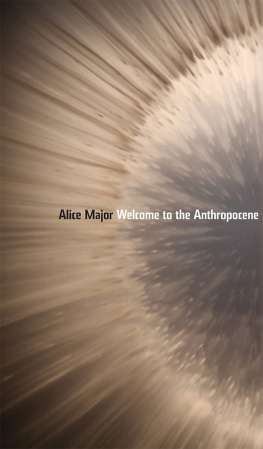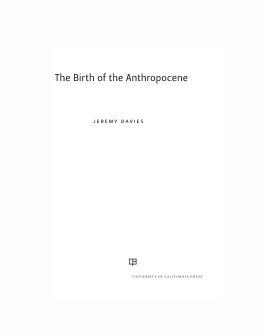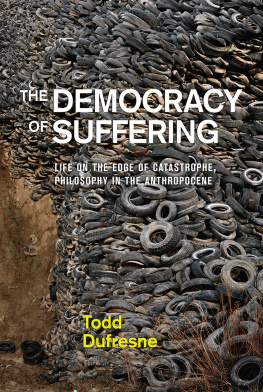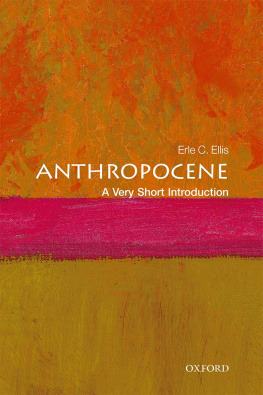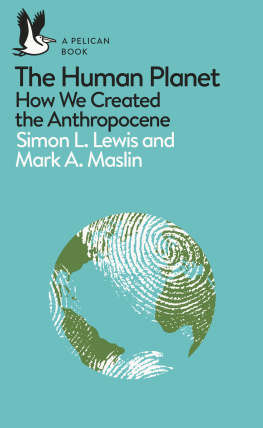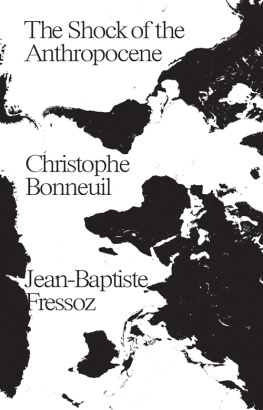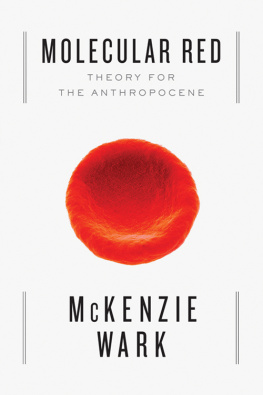Contents

THE ANTHROPOCENE UNCONSCIOUS
THE ANTHROPOCENE
UNCONSCIOUS
Climate Catastrophe Culture
Mark Bould

First published by Verso 2021
Mark Bould 2021
All rights reserved
The moral rights of the author have been asserted
1 3 5 7 9 10 8 6 4 2
Verso
UK: 6 Meard Street, London W1F 0EG
US: 20 Jay Street, Suite 1010, Brooklyn, NY 11201
versobooks.com
Verso is the imprint of New Left Books
ISBN-13: 978-1-83976-047-1
ISBN-13: 978-1-83976-048-8 (UK EBK)
ISBN-13: 978-1-83976-049-5 (US EBK)
British Library Cataloguing in Publication Data
A catalogue record for this book is available from the British Library
Library of Congress Cataloging-in-Publication Data
A catalog record for this book is available from the Library of Congress
Typeset in Adobe Garamond Pro by Hewer Text UK Ltd, Edinburgh
Printed and bound by CPI Group (UK) Ltd, Croydon CR0 4YY
For Andrea,
who asked for the weirdest of birthday presents:
that I write another book.
Having lived through the process, maybe next time youll settle
for a LEGO Technic Fast and Furious Doms Dodge Charger.
Twined we were, entwined, then riven,
Ever to new embracements driven
Herman Melville, John Marr
not in what we glimpse
but in that we yearn to glimpse it,
and in our sense that glimpse it we can
China Miville, Death Cults of East Anglia
Contents
Heartfelt thanks to Anindita Banerjee, Michelle Clarke, Catherine Constable, Megen de Bruin-Mol, Beata Gubasci, Karolina Lebek, Sarah Lohmann, Ania Malinowska, Peter Maurits, Chuckie Palmer-Patel, Sherryl Vint, Brian Willems and Rhys Williams for inviting me to test out parts of this at conferences and seminars. It is so much less bad than it would otherwise have been.
Thanks to Rosie Warren for taking it on and bearing with me through all the delays and all my daft suggestions for cover art and immensely long subtitles.
Thanks also to Mark Wilson, Mark Martin, Maya Osborne and Amelia Ward for all their hard work and support.
That the day job did not defeat this project is down to Charlotte Crofts, Kathrina Glitre, Humberto Prez-Blanco, Steve Presence, Sarah Robertson and Estella Tincknell. Especially Kathrina, without whom I would never get anything done.
Thanks to Junot Daz for asking me to write the thing that spawned the voice I needed.
Big love to China Miville for immediately getting it, insisting I write it and giving so much feedback that (gee thanks) I now have to do a sequel.
Love of similar proportions to Dan Disneycene Hassler-Forest for sharing the struggle. For a while there he was very nearly my new Billy Zane (or at least thats what he asked me to say).
Imagine the world to come.
Imagine we carry on doing too little too late. Imagine we continue to set inadequate emissions targets with no real intention of meeting them, and then keep right on missing them. The parts per million of atmospheric CO2 relentlessly increase. Temperatures rise, releasing the methane naturally sequestered in permafrost and ocean bed clathrates.
The last of the glaciers melt. We lose the polar icecaps, first in the north and then, inexorably, the south. The oceans rise and, since water expands as it warms, rise still more. Low-lying islands disappear. So do the densely populated river deltas. Coastlines retreat. Hundreds of millions flee the inundation. Hundreds of millions more stay behind and die.
Elsewhere deserts form, and agriculture collapses. Daytime temperatures kill. Those who can, take flight.
More refugees. Endless border violence to keep them out.
Skirmishes, then wars, over food and fresh water.
Large-scale geoengineering projects distribute climate amelioration here and foreseen-but-ignored consequences there. Unforeseen consequences fall where they may.
More corpses. Not just human. The sixth great extinction accelerates. As each species diminishes, its environment collapses a little more.
Death cascades.
The planet persists.
But we are gone.
Imagine a world haunted not just by the dead, but by the spectre of death. Drawn ever closer by the already locked-in consequences of our actions and inaction. Its domain extended by endless escalating catastrophe.
Imagine a future of foreclosed possibilities.
Haunted by all the worlds that were, and all the worlds that could have been.
Then imagine as Amitav Ghosh suggests in The Great Derangement (2016), the most widely read and highly regarded book on literature and climate change that somewhere in the middle of all this, in a future in which sea-level rise has swallowed the Sunderbans and made cities like Kolkata, New York, and Bangkok uninhabitable, there are still museums and libraries and bookstores. Picture its inhabitants, urgently examining the art and literature of our time for traces and portents of the upheavals that made their substantially altered world.
This is, of course, nonsense.
It requires us to imagine tidal surges discriminating enough to sweep away significant portions of the science, politics and science fiction shelves, not to mention all that gussied-up climate fiction too fancypants to consider itself sf.
And it requires us to believe future humans will have really poor reading skills. Because the truth is: auguries abound. The art and literature of our time is pregnant with catastrophe, with weather and water, wildness and weirdness.
But the truth is also that mundane fiction what Ghosh calls serious literary fiction has mostly failed to engage with climate change. And, as we will see in chapters two and three, this is because the mainstream bourgeois novel mistook exclusion for insight, a glitch for a feature. Muteness is its unique selling proposition.
Ghoshs account of the built-in shortcomings of mundane fiction is pretty persuasive, but where he sees near-universal failure, The Anthropocene Unconscious often finds negotiations with the limitations of the form. Not silence but expressive aphasia, teeming with tongue-tied questions. Must a text show tides rising in a world that is elsewhere parched, must it mash up Waterworld (1995) and Mad Max: Fury Road (2015), to be about climate change? Must it like Kim Stanley Robinsons Science in the Capital trilogy (20047) and New York 2140 (2017) map the progress of the storm? Must it depict smart people in white coats telling each other things they all already know, but the reader might not, about greenhouse gases, hockey-stick curves, retreating glaciers, shrinking ice sheets, Gulf Stream deceleration, clathrate outgassings and so on? Must the observation of environmental shifts be explicitly connected to climate destabilisation, as is the radically altered migration of monarch butterflies in Barbara Kingsolvers Flight Behaviour (2012)? Must fiction be immediately and explicitly about climate change for it to be fiction about climate change? Is there no room for the symbolic? The oblique? The estranged? No room to think about the capitalist, imperialist, patriarchal histories, systems and structures that are historically and foreseeably responsible for climate destabilisation, and through which it has, is and will be experienced? No room to consider texts that do not say climate change aloud? To discover what happens if we stop assuming a text is not about climate change?

